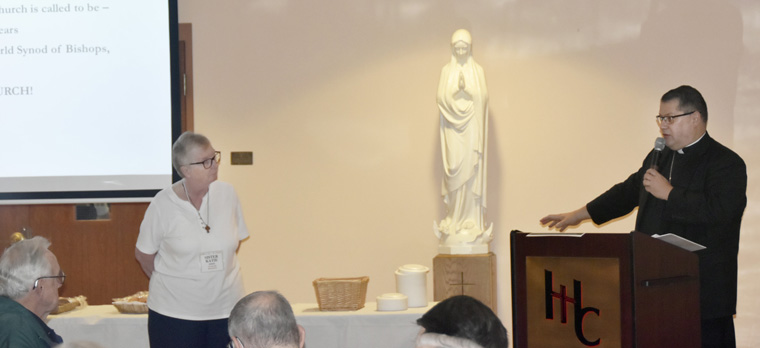By Tom Maguire | Associate editor
To help people “grow in their faith” via the synod process, Bishop Douglas J. Lucia will preside at the Mass celebrating the Opening of the Synod for the Diocese of Syracuse at 5:10 p.m. Oct. 17 at the Cathedral of the Immaculate Conception in Syracuse.
Actions do change people’s hearts, the bishop said at the Sept. 18 meeting of the Diocesan Pastoral Council (DPC) at Holy Cross Church in DeWitt, so the synod will have themes of Communion, Participation and Mission—the same themes will apply to the worldwide Church’s XVI Ordinary General Assembly of the Synod of Bishops in Rome.
Catholic News Service says the Vatican has issued a handbook for dioceses “as part of the global church’s preparation for the 2023 assembly of the Synod of Bishops.”
CNS quotes the handbook: “Pope Francis invites the entire church to reflect on a theme that is decisive for its life and mission: ‘It is precisely this path of synodality which God expects of the church of the third millennium. … The purpose of this synod is not to produce more documents. Rather, it is intended to inspire people to dream about the church we are called to be, to make people’s hopes flourish, to stimulate trust, to bind up wounds, to weave new and deeper relationships, to learn from one another, to build bridges, to enlighten minds, warm hearts, and restore strength to our hands for our common mission.’”
The handbook, CNS says, “offers guidelines for bishops and those helping facilitate the synodal process locally on how they can best listen to and consult with Catholics and the wider community, particularly those on the margins of society, as well as Christians and non-Christians.”
“It engages all of us,” Sister Katie Eiffe, CSJ, the new diocesan Vicar for Religious who will serve as Diocesan Director for Synodal Planning, said of the local synodal effort. “I find that very exciting.”
“We forget what an encounter with Jesus Christ can do for all of us,” Bishop Lucia told the DPC. Listening to the people, he said, will set the course for “where we go” with the local synod. Synodal planning will conform with the bishop’s philosophy “I cannot go back, I can only go forward.”
He has written previously that the local Opening of the Synod Mass “will be followed by listening sessions October through April in all parts of the diocese. This will lead us to the preparation, next spring and summer, of the working document for the diocesan synod, involving further consultation of our diocesan councils. It is in this timeframe that a General Secretariat will be formed, which will oversee the organization and actual meeting of the synod in 2023.”
Bishop Lucia also fielded questions from DPC members:
• Asked about the Latin Mass, the bishop noted that Church has deemed that “other, ancient forms of the Mass” need to be respected.
• He noted that the new Diocesan Shrine of St. Mary of the Assumption in Oswego is a personal parish that may receive funds from the HOPE Appeal, if needed in the future.
• Guided by the National Catholic Bioethics Center, he said that he cannot give a religious exemption to people who decline to be vaccinated against COVID-19. He said the Church “has always taught that a person must go by their well-formed conscience,” but a person must still be considerate of others by, for example, wearing a mask or social distancing. The United States Conference of Catholic Bishops has written (usccb.org): “Given the urgency of this crisis, the lack of available alternative vaccines, and the fact that the connection between an abortion that occurred decades ago and receiving a vaccine produced today is remote, inoculation with the new COVID-19 vaccines in these circumstances can be morally justified.” Bishop Lucia reminds churches about mask wearing, disinfecting and social distancing.
• He cited the diocesan Laudato Si’ Task Force and said the diocese will continue to work on policies that reflect a good stewardship of the earth.
• Explaining the rules governing Mass intentions, Bishop Lucia said one of the Masses on Sundays and Holy Days of Obligation must be offered for the people of the parish.
• Regarding Catholic politicians who promote abortion, he said Pope Francis has said that the Eucharist must never be used as a punishment or a weapon. If Gov. Kathy Hochul came to him, the bishop said, he would say, “I don’t feel that you can come to Holy Communion at this time because of what you said publicly in regard to abortion.” He added, “Now, I cannot be the governor’s conscience. So, on the flip side of that, if she came to me on the Communion line, the Communion line is not the place for political debate.”
Also at the DPC meeting:
• Father John Kurgan, the new Vicar General, outlined his role, saying that he advises and supports the bishop, handling matters including trustee requests from parishes.
• It was announced that new DPC officers will be elected in the spring to serve from 2022 to 2024.
• Diocesan CFO Steve Breen said Beth Lynn Hoey, CFRE, who has been hired as the Executive Director of the Foundation of the Roman Catholic Diocese of Syracuse, effective Oct. 12, 2021, is a “very successful individual in the fundraising world” who will carry forward the diocesan “culture of philanthropy.”
Breen said this year’s HOPE Appeal, which supports various diocesan ministries and meets the needs of people in crisis, launched on Sept. 11 with a goal of $4.15 million. The first follow-up letter will be mailed Nov. 10, and although the campaign will conclude Dec. 31, contributions will be accepted through June 2022. “This is a vitally important fundraiser,” Breen said. Typically, he said, about 20,000 people contribute to the HOPE Appeal.
• Chancellor Danielle Cummings said it has been 15 months since the diocese filed for Chapter 11 reorganization, and CFO Breen said the diocese has spent $3 million hiring counsel for Chapter 11.
Cummings said the diocese had already settled 81 cases under its Independent Reconciliation and Compensation Program for victims of sexual abuse. But 377 new claims have been filed against the diocese alleging sexual abuse by clergy and others in secular roles. The goal of Chapter 11 is to establish a Victims’ Trust Fund for those who have been harmed as well as approve a plan of reorgainization for the Roman Catholic Diocese of Syracuse. The money for the trust, Cummings said, will come from insurance companies, the diocese and separate incorporated entities, such as parishes, that will contribute the smallest piece. By participating, it is expected that parishes/entities will be granted relief from future claims against them, she said. Mediation sessions that will include diocesan representatives, the creditors’ committee and insurance representatives are slated via Zoom on Sept. 28 and 29. All of the diocese’s filings related to the Child Victims Act are on syrdio.org.
• The DPC honored Joseph Stanton, a member of St. Peter’s Parish, Rome, for his longtime work filming the meetings of the DPC.
• DPC members filled out a communications survey that asked for suggestions on improving the diocesan website and asked how they access the various social-media sites of the diocese. Also, DPC members were reminded to listen to the needs of their parishes and identify concerns to be addressed.






